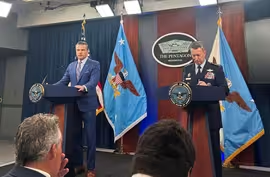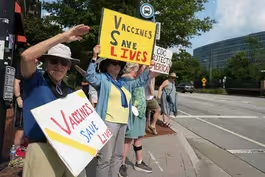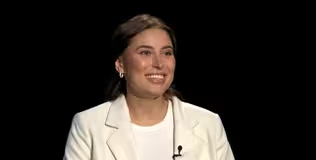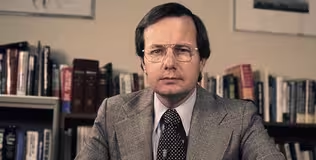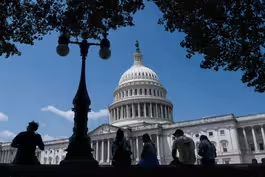
Supreme Court ruling allows states to deny Medicaid funds
Clip: 6/26/2025 | 6mVideo has Closed Captions
Supreme Court clears way for states to deny Medicaid funding for Planned Parenthood
The Supreme Court sided with South Carolina, ruling Planned Parenthood and one of its patients could not sue over that state’s effort to deny it Medicaid funds. The 6-3 decision was split along ideological lines and paves the way for other states to cut funding to abortion-care providers. Geoff Bennett breaks down the case and its implications with PBS News Supreme Court Analyst Amy Howe.
Problems playing video? | Closed Captioning Feedback
Problems playing video? | Closed Captioning Feedback
Major corporate funding for the PBS News Hour is provided by BDO, BNSF, Consumer Cellular, American Cruise Lines, and Raymond James. Funding for the PBS NewsHour Weekend is provided by...

Supreme Court ruling allows states to deny Medicaid funds
Clip: 6/26/2025 | 6mVideo has Closed Captions
The Supreme Court sided with South Carolina, ruling Planned Parenthood and one of its patients could not sue over that state’s effort to deny it Medicaid funds. The 6-3 decision was split along ideological lines and paves the way for other states to cut funding to abortion-care providers. Geoff Bennett breaks down the case and its implications with PBS News Supreme Court Analyst Amy Howe.
Problems playing video? | Closed Captioning Feedback
How to Watch PBS News Hour
PBS News Hour is available to stream on pbs.org and the free PBS App, available on iPhone, Apple TV, Android TV, Android smartphones, Amazon Fire TV, Amazon Fire Tablet, Roku, Samsung Smart TV, and Vizio.
Providing Support for PBS.org
Learn Moreabout PBS online sponsorshipGEOFF BENNETT: The U.S. Supreme Court today sided with South Carolina, ruling Planned Parenthood and one of its patients could not sue over that state's effort to deny it Medicaid funds.
The 6-3 decision split along ideological lines.
And the ruling paves the way for other states to more easily cut off funding to abortion care providers.
To help us break down the case and its implications, we're joined now by Amy Howe, PBS News Supreme Court analyst and co-founder of SCOTUSblog.
Always good to see you.
AMY HOWE: Good to see you too.
Thanks.
GEOFF BENNETT: So this case has big implications, of course, for Planned Parenthood and ultimately abortion access.
But the issue in front of the judges was more technical.
Tell us about that and the broader impact here.
AMY HOWE: Yes, so it is a very technical case.
So Medicaid contains what's known as the any qualified provider provision, which allows Medicaid patients to seek care from any qualified provider.
But it's not enough to just point to a violation of a law.
And we're talking sort of generally.
When you want to go to court, you have to also point to something that gives you a right to sue.
And so the plaintiffs in this case, a private patient and then Planned Parenthood of South Carolina, were relying on a federal civil rights law known as Section 1983 that allows private lawsuits against state and local officials for the violation of rights under the Constitution or U.S. laws.
And the Supreme Court today by a vote of 6-3 said that the plaintiffs can't rely on this federal civil rights law Section 1983, and, therefore, their case can't go forward.
This was an opinion by Justice Neil Gorsuch, joined by the court's other conservative justices.
And he said, particularly when you're talking about a case like the Medicaid Act, in which Congress gives the state's money and, in return for getting the money, the states agree to comply with particular conditions that are outlined in the law, you need to be crystal clear about what the conditions are and the possibility that states could be sued by private individuals.
And, in this case, he said Congress was not clear.
There's no clear and unambiguous right to sue for private plaintiffs.
GEOFF BENNETT: Well, Justice Ketanji Brown Jackson in her dissent said that the ruling was the latest in a series of decisions that weakened civil rights protections and that it was -- quote -- "likely to result in tangible harm to real people."
What kind of harm is she alluding to here?
AMY HOWE: So she had a couple of things that she was thinking of.
And, I mean, first she was making a big picture point, which is that this provision, Section 1983, was enacted back in 1871 as part of a Civil Rights Act that was intended -- that was passed because, in the wake of the Civil War, Congress felt that states weren't protecting people's rights and it wanted to give them the right to go to federal court.
And she said, with its decision today, the majority on the Supreme Court was effectively taking away the only meaningful way that Medicaid patients can vindicate their right to choose their provider.
And she said, in doing so, there's a deeply personal freedom to being able to choose your own provider.
GEOFF BENNETT: Well, on that issue, our team spoke with Mary Ziegler, a professor of law at U.C.
Davis.
She's a historian of abortion law in the U.S. And she said that this ruling is an existential threat to red state providers, but that, if the provisions seeking to cut Planned Parenthood funding in President Trump's budget proposal come to pass, that clinics across the country could be at risk.
MARY ZIEGLER, University of California, Davis, School of Law: It's not going to defund Planned Parenthood's advocacy or political activity.
It's going primarily to hurt affiliates in red states that are going to lose - - potentially lose the ability to stay open.
The impact on Planned Parenthood could be even more sweeping if President Trump's big, beautiful bill passes, because the defunding provisions in it would sweep nationwide.
So it would have a similar effect, potentially shutting down affiliates of groups like Planned Parenthood in blue and purple states, as well as red states.
GEOFF BENNETT: And for a different perspective, here's White House Press Secretary Karoline Leavitt, who hailed this ruling as a win for religious freedom.
KAROLINE LEAVITT, White House Press Secretary: As for the Supreme Court ruling, the president has always maintained that Americans should not be forced to violate their conscience and their religious liberty by having their tax dollars fund abortions, and we're glad the Supreme Court ruled on that side today.
GEOFF BENNETT: How does today's ruling fit within the broader conservative project of rolling back abortion rights at the federal level?
AMY HOWE: Yes, so this was not a case that was specifically about abortion.
The individual patient in this case was not seeking an abortion.
She was seeking other kinds of care from Planned Parenthood.
But, as Professor Ziegler suggests, states can cut Medicaid funding for Planned Parenthood.
And, if they can do that, it makes it less likely that some Planned Parenthood clinics will be open and that they will be able to provide care like the kind that Julie Edwards, the plaintiff in this case, was seeking, but also abortions.
GEOFF BENNETT: And, Amy, we will see you back here at this desk tomorrow, because tomorrow's the last day of the Supreme Court term and we're expecting six big cases.
AMY HOWE: Right.
GEOFF BENNETT: What are they?
AMY HOWE: That's right.
The biggest one that we're watching, of course, is the challenge to President Donald Trump's order ending birthright citizenship.
So they won't -- are not expected to decide the order of whether or not - - whether or not the order is constitutional, but whether or not a district judge can block the order nationwide.
But they also have a case involving whether or not parents can opt their children out of instruction in school using LGBTQ-themed storybooks.
There's a challenge to Louisiana's congressional map.
There's a challenge to Texas' age verification requirement for porn Web sites.
There's a case involving the structure of a panel, a task force that makes recommendations about preventive care.
And so it's going to be a really big day at the Supreme Court.
GEOFF BENNETT: Well, we are grateful to have you here walking us through all of it.
Amy Howe, thanks, as always.
AMY HOWE: Thanks for having me.
Analyzing Iran nuclear damage with former arms inspector
Video has Closed Captions
Clip: 6/26/2025 | 7m 31s | Iran's nuclear program ruined for now, deal needed to keep it that way, ex-inspector warns (7m 31s)
Ex-surgeon general on vaccine panel overhauled by RFK Jr.
Video has Closed Captions
Clip: 6/26/2025 | 7m 9s | Trump's former surgeon general raises concerns about vaccine panel overhauled by RFK Jr. (7m 9s)
Ksenia Karelina describes life after release from Russia
Video has Closed Captions
Clip: 6/26/2025 | 9m 43s | Ksenia Karelina says release from Russian prison 'feels like starting a new life' (9m 43s)
Remembering acclaimed public TV journalist Bill Moyers
Video has Closed Captions
Clip: 6/26/2025 | 5m 56s | Remembering acclaimed public TV journalist Bill Moyers (5m 56s)
Sen. Rounds says Iran nuclear threat 'seriously eliminated'
Video has Closed Captions
Clip: 6/26/2025 | 6m 45s | GOP Sen. Rounds says Iran nuclear threat 'very seriously eliminated' (6m 45s)
Who gains and who loses under Trump’s big budget bill
Video has Closed Captions
Clip: 6/26/2025 | 5m 14s | Who gains and who loses under Trump’s big budget bill (5m 14s)
Providing Support for PBS.org
Learn Moreabout PBS online sponsorship
- News and Public Affairs

FRONTLINE is investigative journalism that questions, explains and changes our world.

- News and Public Affairs

Amanpour and Company features conversations with leaders and decision makers.












Support for PBS provided by:
Major corporate funding for the PBS News Hour is provided by BDO, BNSF, Consumer Cellular, American Cruise Lines, and Raymond James. Funding for the PBS NewsHour Weekend is provided by...

